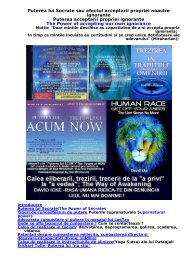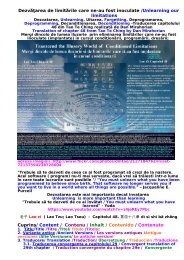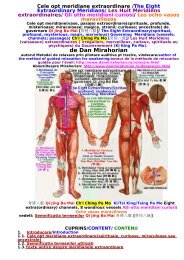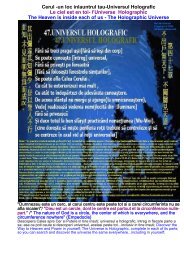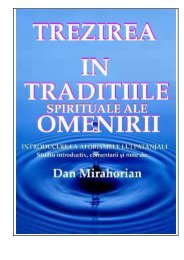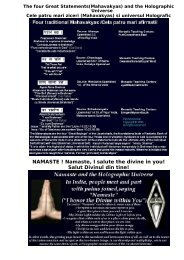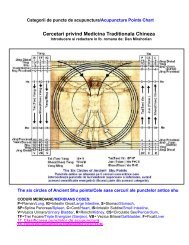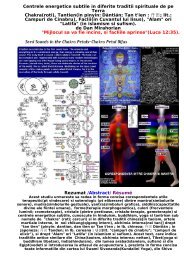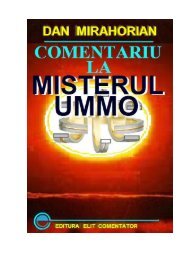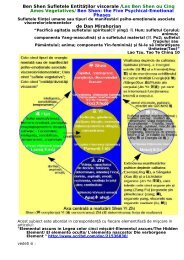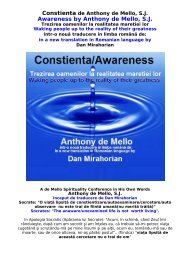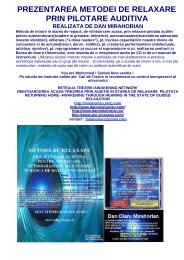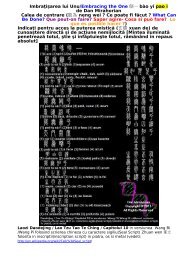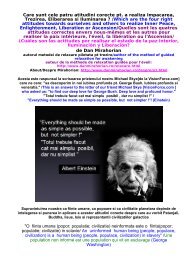äºè¡ææ¯å è¡ ? - Mirahorian
äºè¡ææ¯å è¡ ? - Mirahorian
äºè¡ææ¯å è¡ ? - Mirahorian
You also want an ePaper? Increase the reach of your titles
YUMPU automatically turns print PDFs into web optimized ePapers that Google loves.
This simple, yet very effective qigong, specifically influences our state of mind and<br />
cleanses the internal organs. Long ago, Chinese healers noted that our emotions<br />
affect the function of our organs and vice versa. A specific combination of sound,<br />
breathing, and movement prompts our organs to release negative emotions,<br />
clearing the way for better health. The practice of the Six Healing Sounds for<br />
Nourishing Life has a long history.<br />
The six healing sound qigong was found circa 250 A.D. during the Qin Chin<br />
Dynasty (221-207 B.C.) in China. As early as the there has been a record of<br />
healing sound practices. During the Sui Dynasty (590 - 618 A.D.), a Taintai<br />
Buddhist high priest, Zhi Zhuan, pointed out the healing potential of the Six<br />
Healing sounds.<br />
The Six healing Sounds were recorded as Chui, Hu, Xi, Ke, Xu, and Si.<br />
In the Tang Dynasty (618-906 A.D.) a medical expert and doctor of TCM, Sun Si-<br />
Miao, wrote in the Song of Hygiene about the Six Healing Sounds and can be<br />
paraphrased as follows:<br />
The Liver and Spring are classified as Wood elements; the Xu sound in<br />
the Spring will brighten the eyes and relieve liver stagnation. The Heart<br />
and Summer are classified as Fire Elements; the Ke sound in the<br />
Summer will relieve fire in the heart. The Lungs and Fall are classified as<br />
Metal elements; the Si sound in the Fall will nourish the lungs. The<br />
Kidneys and Winter are classified as Water elements; the Chui sound in<br />
the Winter will keep the kidneys at ease. The Xi sound will regulate the<br />
Triple Burner and eliminate annoying heat. The Hu sound during the<br />
four seasons will assists the assimilation of food by the spleen. It is not<br />
necessary to make any noise when you practice. The benefit is greater<br />
than miraculous pills.<br />
Grandmaster Liang's mother, Ms. Huang Zhe-Xi, was very sickly in her youth. She<br />
went to Huang Mountain to learn the Six Healing Sounds. Later, she also studied<br />
from the well-known Qigong master, Master Ma Li-Tang. From then on, her health<br />
got better and better and she was filled with energy.<br />
The practice of the Six healing sounds is very flexible. You can practice all<br />
six sounds in order or only practice specific sounds to treat specific<br />
conditions in the body. You can also practice the sounds according to the<br />
seasons of the year. If you practice all six healing sounds, you should<br />
practice them in this order: Xu, Ke, Hu, Si, Chui, and Xi.<br />
This form of qigong uses sounds, breath and movements of the arms and<br />
some other body parts to improve energy circulation. Each sound is<br />
associated with an internal organ system, an external sense organ and an<br />
emotion: Xu is related to the liver and gall bladder, its external sense<br />
organ is the eyes and its emotion is anger. Ker is related to the heart and<br />
the small intestine, it external sense organ is the tongue and its emotion<br />
is joy. Hoo is related to the spleen and the stomach, its external sense<br />
organ is the mouth and its emotion is pensiveness. Sia is related to the<br />
lung and the large intestine, its external sense organ is the nose and its<br />
emotion is sorrow.<br />
Element<br />
[Faza]<br />
Lemn Foc Pamant Metal Apa Ether<br />
Organ<br />
[meridian]Yin<br />
Ficat[F]<br />
Liver,<br />
Cord[C]<br />
Heart<br />
Splina-<br />
Pancreas[SP]<br />
Spleen<br />
Plamani[P<br />
Lungs<br />
Rinichi[R]<br />
Kidneys<br />
Trei<br />
Focare[TF]<br />
Triple<br />
Burner<br />
Organ<br />
[meridian]<br />
Yang<br />
Deschideri<br />
specifice<br />
Vezica<br />
Biliara[VB<br />
]<br />
Gallbladd<br />
er<br />
Intestin<br />
Small<br />
Intestine<br />
Stomac[S]<br />
Stomach<br />
Intestin<br />
Large<br />
Intestine<br />
Vezica<br />
Ochi Limba Gura Nas Urechi --<br />
Circulatie<br />
Sex[CS]



